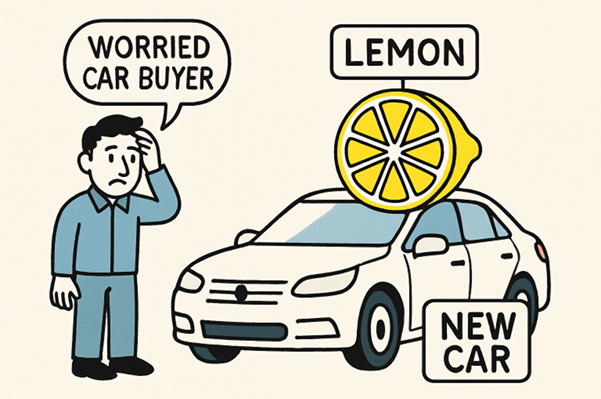Table of Contents
- Introduction
- What Are Lemon Laws?
- How Lemon Laws Protect Consumers
- Recent Changes in Lemon Laws
- Steps to Take If You Have a Lemon
- Common Misconceptions About Lemon Laws
- The Role of Lemon Law Attorneys
- Resources for Consumers
- Conclusion
Buying a new car is an exciting milestone for many, but the excitement can fade quickly if you end up with a vehicle plagued by ongoing problems. Defective cars, commonly referred to as “lemons,” can cause significant financial and emotional stress for consumers. Fortunately, lemon laws exist to protect car buyers and provide clear options when issues arise with a purchase. Consumers in certain regions, such as those looking for Vermont lemon law attorneys, can access specialized legal help to guide them through the process of seeking recourse for defective vehicles.
Lemon laws ensure that manufacturers cannot ignore persistent vehicle defects and that consumers have recourse if a new car proves to be unreliable. With increased consumer awareness and evolving state regulations, understanding the nature and scope of lemon laws is more important than ever for car buyers across the U.S.
Although lemon laws are designed to offer robust protection, the specifics can vary widely from state to state, and recent legislative updates have sharpened the focus on consumers’ rights. Learning about these laws and current updates is crucial to staying informed and obtaining the assistance you need if your new purchase fails to meet expectations. For SEO.
What Are Lemon Laws?
Lemon laws are state-level statutes designed to protect consumers who purchase new vehicles that turn out to have substantial defects affecting their use, value, or safety. Most lemon law statutes oblige auto manufacturers to either repair, replace, or refund a vehicle if it meets the legal definition of a lemon—usually after several failed repair attempts or after the car is out of service for an extended period. While lemon laws primarily focus on new vehicles, a handful of states also extend protections to used car buyers. The exact rules, coverage limitations, and procedures necessary to declare a car a lemon depend on where you live, meaning it’s essential for buyers to get familiar with their own state’s rules following a purchase.

How Lemon Laws Protect Consumers
Lemon laws serve as a safety net for car buyers, making sure that defective products are handled by manufacturers, not by unlucky owners. Key consumer protections offered by lemon laws generally include:
- Replacement vehicle if repairs are ineffective
- Full or partial refund of the purchase price
- Court or mediation costs are covered in some situations
- Coverage of repair or towing costs, depending on state statutes
These protections are designed to prevent consumers from bearing the cost of a vehicle that fails to meet reasonable expectations for quality and performance.
Recent Changes in Lemon Laws
Several states have revised their lemon laws to address gaps in consumer protection and streamline the claims process. For instance, California introduced Assembly Bill 1755 in late 2024, which imposed tighter claim deadlines and clarified procedural requirements. While the intention was to simplify the claims process, some consumer advocates worry that these stricter timelines may actually make it harder for buyers to qualify for relief. For more on this, an in-depth report from KPBS News discusses the controversy. Updates like these are becoming more common as lawmakers respond to emerging trends in auto manufacturing and consumer complaints. However, these changes can present new challenges for buyers who may need more time or guidance to navigate the newly updated regulations.
Steps to Take If You Have a Lemon
If you suspect your car qualifies as a lemon, follow these recommended steps to protect your interests:
- Document every repair visit and keep thorough records of your communications with the dealer or manufacturer, including emails and receipts.
- Read and understand your state’s lemon law to see if your situation qualifies and to know your rights.
- Reach out to a consumer protection or lemon law attorney who can advise you on the next steps and help ensure the best possible outcome.
Common Misconceptions About Lemon Laws
There are several widespread misconceptions about lemon laws, including:
- The belief that lemon laws cover every issue with a new car. In reality, eligible defects must typically substantially affect the vehicle’s use, safety, or value.
- Assuming that used vehicles have the same protections as new cars. Only certain states protect used car buyers under lemon law statutes, and limitations often apply.
The Role of Lemon Law Attorneys
While lemon laws empower consumers to seek remedies for defective vehicles, navigating the process can still be complex—especially when dealing with manufacturers or dealerships that resist accountability. Lemon law attorneys specialize in interpreting state-specific regulations, gathering essential documentation, and negotiating directly with automakers to secure replacements, refunds, or settlements. These legal professionals understand the nuances of warranty claims and procedural deadlines, helping clients avoid costly mistakes that could jeopardize their case. In states such as Vermont, lemon law attorneys are particularly valuable allies for consumers seeking justice after purchasing a faulty car. Having skilled representation not only increases the likelihood of a successful claim but also reduces the stress and uncertainty of dealing with legal and technical paperwork on your own.
Resources for Consumers
For detailed guides on lemon law rights and what to expect during the claims process, buyers can consult resources like the FindLaw Lemon Law page and similar reputable legal information sites for guidance.
Conclusion
Lemon laws are a powerful form of consumer protection in the automotive industry, providing buyers with the means to address major vehicle defects and ensure fair treatment. By staying informed about evolving legislation and knowing the steps to take if an issue arises, car buyers can confidently navigate the process of seeking repairs, replacements, or refunds when needed.











